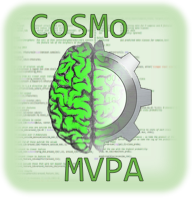run compare dsm¶
- run_up:
run_compare_dsm
%% RSA Tutorial
% Compare DSMs
%
% # For CoSMoMVPA's copyright information and license terms, #
% # see the COPYING file distributed with CoSMoMVPA. #
subjects = {'s01', 's02', 's03', 's04', 's05', 's06', 's07', 's08'};
masks = {'ev_mask.nii', 'vt_mask.nii'};
config = cosmo_config();
study_path = fullfile(config.tutorial_data_path, 'ak6');
%%
% In a nested loop over masks then subjects:
% load each dataset
% demean it, get DSM, save it in dsms
n_subjects = numel(subjects);
n_masks = numel(masks);
counter = 0;
for m = 1:n_masks
msk = masks{m};
for s = 1:length(subjects)
sub = subjects{s};
sub_path = fullfile(study_path, sub);
% load dataset
ds_fn = fullfile(sub_path, 'glm_T_stats_perrun.nii');
mask_fn = fullfile(sub_path, msk);
ds_full = cosmo_fmri_dataset(ds_fn, ...
'mask', mask_fn, ...
'targets', repmat(1:6, 1, 10)');
% compute average for each unique target
ds = cosmo_fx(ds_full, @(x)mean(x, 1), 'targets', 1);
% remove constant features
ds = cosmo_remove_useless_data(ds);
% demean
% Comment this out to see the effects of demeaning vs. not
ds.samples = bsxfun(@minus, ds.samples, mean(ds.samples, 1));
% compute the one-minus-correlation value for each pair of
% targets.
% (Hint: use cosmo_pdist with the 'correlation' argument)
dsm = cosmo_pdist(ds.samples, 'correlation');
if counter == 0
% first dsm, allocate space
n_pairs = numel(dsm);
neural_dsms = zeros(n_subjects * n_masks, n_pairs);
end
% increase counter and store the dsm as the counter-th row in
% 'neural_dsms'
counter = counter + 1;
neural_dsms(counter, :) = dsm;
end
end
%%
% Then add the v1 model and behavioral DSMs
models_path = fullfile(study_path, 'models');
load(fullfile(models_path, 'v1_model.mat'));
load(fullfile(models_path, 'behav_sim.mat'));
% add to dsms (hint: use comso_squareform)
v1_model_sf = cosmo_squareform(v1_model);
behav_model_sf = cosmo_squareform(behav);
% ensure row vector because Matlab and Octave return
% row and column vectors, respectively
dsms = [neural_dsms; v1_model_sf(:)'; behav_model_sf(:)'];
%%
% Now visualize the cross-correlation matrix. Remember that 'cosmo_corr'
% (or the builtin 'corr') calculates correlation coefficients between
% columns and we want between rows, so the data has to be transposed.
cc = cosmo_corr(dsms');
figure();
imagesc(cc);
%%
% Now use the values in the last two rows of the cross correlation matrix to
% visualize the distributions in correlations between the neural similarities
% and the v1 model/behavioral ratings. Store the result in a matrix
% 'cc_models', which should have 8 rows (corresponding to the participants)
% and 4 columns (corresponding to EV and VT correlated with both models)
%
% Rows 1 to 8: EV neural similarities
% Rows 9 to 16: VT neural similarities
% Row 17: EV model
% Row 18: behavioural similarities
cc_models = [cc(1:8, 17) cc(9:16, 17) cc(1:8, 18) cc(9:16, 18)];
labels = {'v1 model~EV', 'v1 model~VT', 'behav~EV', 'behav~VT'};
figure();
boxplot(cc_models);
set(gca, 'XTick', [1:4], 'XTickLabel', labels);

